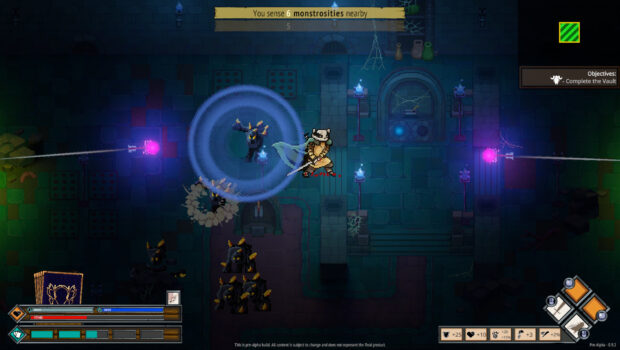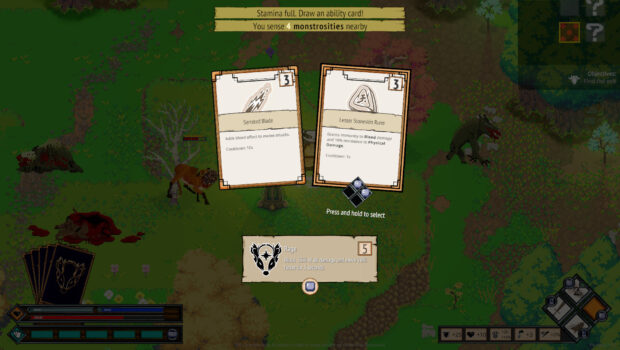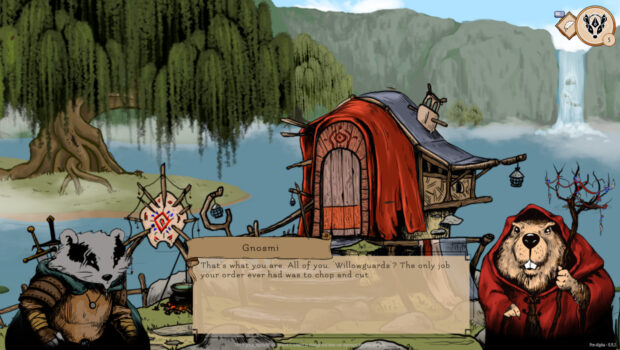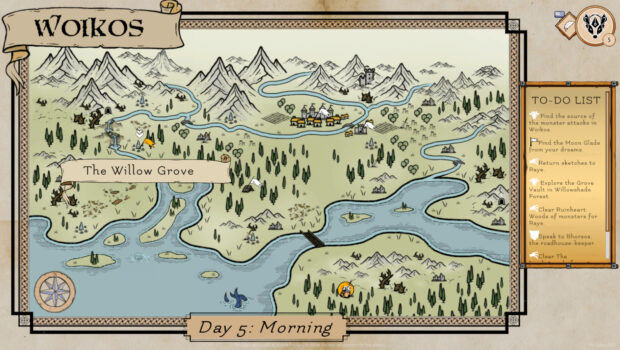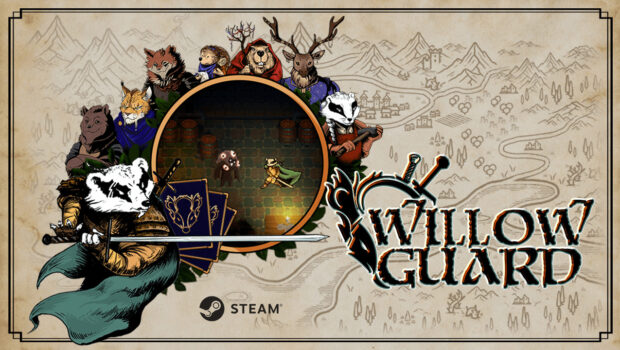Content Warnings
The pixel-art action gameplay is a little gory, but nothing too bad. There is violence, and sometimes Ghweros says 'damn', or gets a little philosophical about things like free will.Project Introduction
Willow Guard is a passion project and an experiment. We want to tell a story - a story about absent gods giving a voice and soul to animals, and then abandoning them, about past mistakes catching up to you, about small struggles - a socially awkward badger having a difficult time reaching out to others - and huge, epic struggles - like extra-planar invaders attempting to devour the Willow trees that give the animals their souls. At the same time we want to sell you the fantasy of being a Willow Guard through action-filled gameplay where you get to slaughter your enemies with swordplay and magic.The plot starts with Ghweros, a badger Willowguard, arriving at the small town of Woikos near the Hinterlands - the edges of civilization - responding to a call for help in the face of increased monster attacks. Woikos is built on the ruins of a once-mighty Polis, a city of the (now-absent) Gods, and the forests around it are rife with dungeons, ruins, and secrets. Ghweros soon finds that there is more to these attacks than just a mindless incursion of beasts, and his investigation begins to uncover the deepest secret of the world itself - why the Gods abandoned Tersa.
The story-related gameplay is not simply making dialog choices: Ghweros is half-wild, which makes him an outcast among his fellow Willow Guards, but it also gives him access to abilities that most animals have all but forgotten, such as sharp instincts. As Ghweros you will have to make decisions that shape your character down four Inclinations:
- Creed (your adherence to the Willow Guard creed)
- Instinct (allowing yourself to follow your natural instincts - considered blasphemous by most animals, a rejection of the gift of the gods)
- Empathy (a difficul path, forcing Ghweros to consider the views of others instead of the mission at hand)
- Neuroticism (his tendency to hyperfocus on things, both good and bad)
We want the player to have a choice in how Ghweros behaves and reacts to things, while at the same time telling the story of -a- particular character. Ghweros starts off as awkward and isolated, but as he interacts with the world, he grows and changes (almost every decision you make increases one or more of these stats). Different characters you meet will also respond in different ways to your Inclinations.
There is a fifth inclination, called Focus. Ghweros, as a half-wild animal, can only focus for so long on investigations and conversations before his attention begins to slip. Many actions in the world cost Focus, and the only way to regain Focus is by going into battle (or resting). Thus, there is a natural push-and-pull between the action and the story gameplay.
The story gameplay also features a full inventory of items and clues that can be used to further your investigation into the monster attacks. Typically, you would get a clue (or an item) through some interaction, and then use that clue (or item) with various characters to see what they say. Although currently not implemented, the idea is to have some basic 'clue crafting' as well, letting you combine various clues (or items) to further your investigation. Talking to characters, sharing clues, and completing quests is how new locations, characters and plot points are unlocked on the map.
Finally, the story gameplay is time-based. Certain actions (usually a story-related dungeon) will cause time to pass from Morning to Evening. When this happens, characters move around, certain places open up or close, dungeons become more difficult (and rewarding), and the story moves forward. These moments are always clearly telegraphed, so the player can decide exactly when they want to move on. Deciding what to tackle when and in what order can have dire effects on the story - do you clear the lumberyard to give Woikos's headman a chance to finish his palisade, or do you spend the day gathering arusa nuts for the local midwife to heal the Willow trees?
For the action gameplay, we've introduced a type of deckbuilding gameplay: you bring with you a deck of cards that you craft and upgrade using various materials that you gather during the action gameplay, or receive as rewards. These cards represent your Willowguard abilities or equipment - you begin every level with nothing, and then as you play you pull cards from your deck and use them to improve yourself. This makes every fight different.
The action gameplay is also slightly rogue-liteish. There are no saves during a dungeon, which raises the stakes, but on the other hand each dungeon can usually be completed in a few minutes. As most dungeons are generated from a list of hand-made rooms strung together randomly, plus the random draw of cards, plus some randomization on the number and type of enemies spawned, it generally means the action gameplay neither has time to outstay its welcome nor become boring even when repeated multiple times.
On top of that, there are more bespoke dungeons that contain more 'traditional' encounters, puzzles, and story-bits. Parts of these are also very lightly Metroidvainia-ish, as your abilities can be used to unlock shortcuts, secrets, or solve puzzles (for example, using a bomb to blow up a brittle wall, melting a fence using acid, or using shadowstep to phase through an arcane barrier).
About Developer
MiTale is a Finnish company, based in Turku but with developers from all over Finland (and some international guest stars too). The CEO is Natasha Skult, officially-awarded MVP of the Finnish gaming scene, chair-emeritus of IGDA Global, and general go-getter and fire-starter, involved in too many projects to list both in Finland, in Europe, and globally. The one writing this is Petter Skult, her husband. Hi.MiTale mainly does a lot of B2B work, which finances our passion projects and the things we actually want to do - such as Willow Guard. Currently we have about 10 people who've worked on or are working on Willow Guard on and off, including 2D artists, musicians, coders, and writers (okay, writer. Me).
